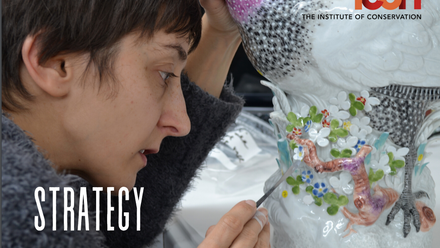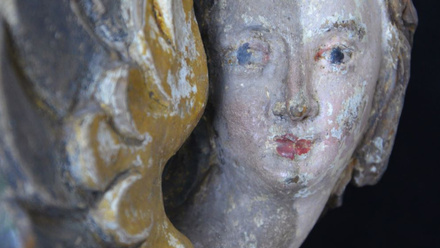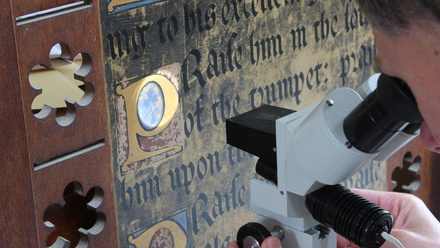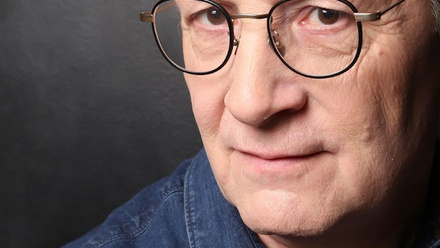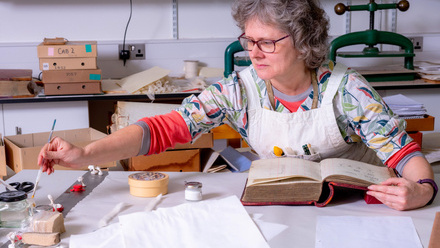Icon Strategy (Text version)
This is the plain-text version of the Icon Strategy. You can download the original pdf below:
The conservation of objects and collections protects the things people value. It enables the care and safeguarding of our tangible cultural heritage, from cherished family heirlooms to national treasures.
Conservation professionals value and understand the physical artefacts that embody our collective history and culture; skilfully safeguarding it against decay and neglect to ensure that everyone’s stories survive for the inspiration of present and future generations.
The practice of conservation encompasses artworks, books and archives, textiles, architecture and archaeology, as well as industrial, natural and social history collections whether they are held by museums, heritage organisations, private collectors or public bodies.
Conservation professionals work in a variety of disciplines. Many are conservators but Icon’s membership also embraces heritage scientists, craftspeople, architects, archivists and others.Professionalism means:
|
About Icon
Icon (the Institute of Conservation) is a charitable company working to safeguard cultural heritage. Icon is also the professional membership body for the conservation profession.
Icon’s vision is to protect, preserve and promote our treasured cultural heritage through cultivating skilled conservation professionals, supporting meaningful collaboration across the cultural heritage sector, and delivering public benefit through engagement and advocacy.
Icon’s mission is to represent and support the practice and profession of conservation by promoting the public value of caring for cultural heritage and upholding high standards and ethics in conservation practice. Icon ensures that the guardians and owners of objects, buildings and collections can access knowledgeable and passionate professionals who will help them safeguard the physical remains of our past for the future.
Our Charitable Objects are:
- To advance the education of the public by research into and the promotion of the conservation of items and collections of items of cultural, aesthetic, historic and scientific value; and
- To preserve and conserve items and collections of items of cultural, aesthetic, historic and scientific value.
The following values underpin our activities:
- Work with integrity: we are open and honest and do what we believe is best for our shared cultural heritage, the public and our members.
- Be inclusive: we value diversity and ensure that opportunities are open to all those who want to care for our heritage.
- Be forward and outward-looking: we keep our eyes on the horizon and on the world around us.
- Be ambitious advocates: both for our organisation and the things we believe in.
- Be collaborative and generous: we work with our members and partners to achieve the best results together.
- Uphold high standards: we value, support and promote the expertise and professionalism of our members and partners.
Our strategic focus
Conservation helps us understand ourselves and our future by preserving our past and ensuring that it is accessible for current and future generations to learn from and enjoy. However, much of this work is hidden from public view because it takes place in private workshops or conservation studios in museums. The impact of the important work carried out by conservation professionals is largely invisible unless attention is drawn to specific outcomes through interpretation and engagement. This means that the benefits that conservation brings to society are not recognised and are therefore not valued.
Conservation brings benefits to society in six key areas:
|
This Strategy sets out Icon’s aim to achieve wider recognition of the value that conservation brings to society. We will also seek to ensure that the work of conservation professionals is recognised and respected.
Over the coming years we will build on the work of our Values of Conservation project and will demonstrate and share the many ways in which conservation brings benefits to people and society through the holistic care of objects, buildings and collections. We will focus our energy on demonstrating the positive impact of conservation, increasing understanding of the profession, and raising its public profile. This will lead to greater respect for conservators, heritage scientists and related conservation professionals. A more visible conservation profession will also have greater influence in the major debates that impact on the care of our shared cultural heritage.
We have identified four key audiences for our work:
- the public
- stakeholders (including funders, cultural leaders and policy-makers)
- young people
- the profession (members and non-members)
How are we going to do this?
To deliver our ambition and to ensure that our work makes a positive difference for our members and for society we have identified a set of high-level priorities and the outcomes that we will seek to achieve.
1. Champion cultural heritage and the value of conservation
Audience: stakeholders and the public
Clients, stakeholders and members of the public will understand the value of conservation and will seek out appropriate professionals to care for their objects, buildings and collections. Icon will be recognised as the authoritative source of advice on conservation policy and practice and as the leading advocate for conservation and collections care.
We will:
-
- Deliver impactful advocacy campaigns that increase public understanding of conservation e.g. Conservation in Action
- Engage with Government and sector policy-makers, commissioning research to provide an evidence-base where needed
- Extend our influence and increase our profile through ambassadorial activities such as creating and supporting a Patrons Scheme, developing Icon Fellowship and seeking honours for conservation professionals
- Promote the Conservation Register to clients and work with like-minded professional bodies to make it easier for clients to access competent conservation professionals
2. Extend our reach within the UK and internationally
Audience: the public and the profession
More people will value and engage with cultural heritage and conservation. Icon will be strengthened and enriched through having a broader range of conservation professionals within its global membership.
We will:
- Nurture all those who wish to support conservation and seek out ways to bring a wider range of people into contact with Icon
- Champion the value that conservation brings to all societies in all places
- Exchange information and expertise with new and existing partners
- Build collaborative relationships with like-minded organisations to capitalise on opportunities
- Aim to attract, and where appropriate accredit, currently under-represented conservation specialisms and related disciplines
3. Maintain high standards in conservation practice
Audience: the profession and the public
Conservation professionals will have the skills, knowledge and judgement to care for objects, buildings and collections consistently and thoughtfully. Clients, stakeholders and members of the public will understand the value of accreditation and the importance of professional standards and ethics.
We will:
- Work with education providers to ensure that training courses meet the needs of employers in the cultural heritage sector
- Provide high quality opportunities for ongoing professional development
- Nurture the exchange of knowledge and ideas through our Groups and Networks
- Continue to develop and promote Icon Accreditation, making it more accessible to members and more attractive to clients, commissioners and employers
- Investigate the potential for chartership
4. Develop conservation as an inclusive and rewarding career
Audience: young people and the profession
Young people will be inspired to pursue a career in conservation. The profession will become more representative of the society it serves. Conservation professionals will be better rewarded for their skills, expertise and professionalism.
We will:
- Work with partners and develop resources to inspire school pupils to consider a career in conservation and heritage science
- Work with partners to build a more diverse and equal cultural heritage sector
- Support the continued development of vocational routes into the conservation profession
- Strive to overcome the barriers that make conservation a less rewarding career than it should be
- Ensure that there are opportunities for emerging professionals to move from training into rewarding paid employment
5. Strengthen our Institute
Audience: the profession
Icon will strengthen its operational capacity and will create a solid foundation from which to grow. Long-term sustainability in the business will arise from:
- Financial resilience – developing a stable and effective business, which is robustly governed and able to support growth through increasing our reserves
- Environmental responsibility – reducing our organisational footprint and offering leadership and guidance to the profession
- Social responsibility – diversifying the profession and working to create a greater feeling of inclusion and belonging within the membership
We will also:
- Prioritise membership growth by providing a compelling membership offer and ensuring that Icon is a welcoming place for all conservators, heritage scientists and the many others who play a role in conservation, regardless of their specialism or their working environment
- Enhance our operational effectiveness by welcoming feedback from members and stakeholders and by embracing a culture of continuous improvement within the organisation
- Foster a greater sense of collective responsibility and ownership in our Institute by encouraging more members to get involved in our work – at every level – and fully recognising the valuable contribution that members make to the profession.

